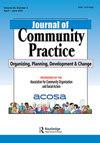The enduring backlash against racial justice in the United States: mobilizing strategies for institutional change
IF 1.2
Q2 SOCIAL WORK
引用次数: 6
Abstract
This essay offers a framework for contextualizing racial injustice in contemporary Black and Brown communities. We argue that present-day racial injustice in the United States is a continuation of historical patterns of discrimination that have been institutionalized and reaffirmed for centuries (Gordon-Reed, 2021). At the same time, we underscore how racism and racial injustice have assumed distinctive forms during the post-civil rights era. While the passage of civil rights legislation in the 1960s represented a watershed moment in our history, it also triggered sustained backlash from opponents to racial justice in the United States (Glickman, 2020). This legislation and opposition during the post-civil rights era is significant because of the scope and magnitude of the policies adopted, as well as resistance to them. Legislation such as the 1964 Civil Rights Act, the 1964 Economic Opportunity Act, the 1965 Voting Rights Act, the 1965 Immigration and Naturalization Act, and the 1968 Fair Housing Act have been flashpoints for resistance (Boussac, 2021; Rieder, 1989). From its inception, opponents worked feverishly to dismantle these legislative acts which were encapsulated under the umbrella of the War on Poverty. Largely, their efforts have resulted in the curtailment and reversal of civil rights policies. It is notable that this opposition was built on a foundation of sustained discourse drawing from right-wing ideologies supporting racism and oppression, racial microaggressions, stereotypes and tropes mobilized to block the implementation of civil rights policies, and reconstructed color lines in the United States (Boussac, 2021; Rieder, 1989). We offer this framework as a reference point for contextualizing the articles in this special issue on racial justice in Black and Brown communities. As the title of the special issue suggests, this framework is introduced in order to move beyond paying lip service to the topics covered in these articles. Understanding how racial discourse has been used (and misused) by opponents of civil rights is critical. We argue that opposition to civil rights legislation emerged as an organizing principle of the political right in the United States during the early 1960s. Although overlooked, this shift in political strategy is arguably one of the more successful policy agendas implemented during the contemporary period. Political conservatives, who constitute the美国对种族正义的持久反对:动员制度变革战略
本文为当代黑人和棕色人种社区的种族不公正提供了一个背景框架。我们认为,当今美国的种族不公正是几个世纪以来被制度化和重申的历史歧视模式的延续(Gordon Reed,2021)。与此同时,我们强调种族主义和种族不公正是如何在后民权时代呈现出独特形式的。虽然20世纪60年代民权立法的通过代表了我们历史上的一个分水岭时刻,但它也引发了美国种族正义反对者的持续反弹(Glickman,2020)。这项立法和后民权时代的反对意义重大,因为所采取的政策的范围和规模,以及对这些政策的抵制。1964年《民权法》、1964年《经济机会法》、1965年《投票权法》、1968年《移民和归化法》和1968年《公平住房法》等立法一直是抵制的热点(Boussac,2021;Rieder,1989)。从一开始,反对者就狂热地试图废除这些被概括在反贫困战争保护伞下的立法法案。在很大程度上,他们的努力导致了民权政策的缩减和逆转。值得注意的是,这种反对建立在持续话语的基础上,这些话语来自支持种族主义和压迫的右翼意识形态、种族微侵犯、被动员起来阻止民权政策实施的刻板印象和比喻,以及重建美国的肤色线(Boussac,2021;里德,1989年)。我们提供这个框架作为参考点,将本期关于黑人和棕色人种社区种族正义的特刊文章置于背景中。正如特刊的标题所表明的那样,引入这一框架是为了超越对这些文章所涵盖的主题的口头承诺。了解民权反对者如何使用(和滥用)种族话语至关重要。我们认为,反对民权立法是20世纪60年代初美国政治权利的一项组织原则。尽管被忽视了,但这种政治战略的转变可以说是当代实施的更成功的政策议程之一。政治保守派,他们构成
本文章由计算机程序翻译,如有差异,请以英文原文为准。
求助全文
约1分钟内获得全文
求助全文
来源期刊

Journal of Community Practice
SOCIAL WORK-
CiteScore
2.40
自引率
18.20%
发文量
27
期刊介绍:
The Journal of Community Practice is an interdisciplinary journal grounded in social work. It is designed to provide a forum for community practice, including community organizing, planning, social administration, organizational development, community development, and social change. The journal contributes to the advancement of knowledge related to numerous disciplines, including social work and the social sciences, urban planning, social and economic development, community organizing, policy analysis, urban and rural sociology, community health, public administration, and nonprofit management. As a forum for authors and a resource for readers, this journal makes an invaluable contribution to the community"s conceptualization, applications, and practice.
 求助内容:
求助内容: 应助结果提醒方式:
应助结果提醒方式:


